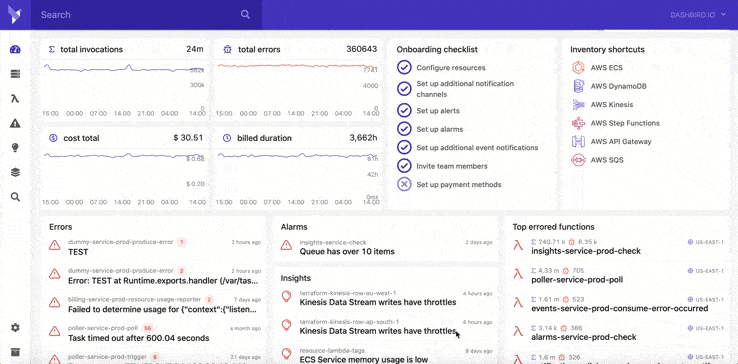To me personally, when I think programming languages I think JavaScript and while 67% of the developers out there might think the same (at first) that does not imply it's the most efficient programming language to use with AWS Lambda.
So without further ado, here we go.
1. Java
Java has been in service for decades and is, to this day, a reliable option when choosing the backbone of your stack. With AWS Lambda is no different as it makes a strong candidate for your functions.
Java applications in AWS Lambda have the following merits
Reliable and well-tested libraries. The libraries will make life easy for you through enhanced testability and maintainability of AWS Lambda tasks.
Predictive performance. While Java has slower spin uptime, you can easily predict the memory needs of your functions and to counteract those dreaded colds starts you can just up your memory allocation.
Tooling Support. Java has a wide range of tooling support which includes Eclipse, IntelliJ IDEA, Maven, and Gradle among others.
If you're wondering how Java remains an efficient AWS lambda language, here is the answer. Java has unique characteristics like multi-thread concurrency, platform independence, security, and object-orientation.
2. Node.js
I'm definitely biased but Node.js is probably the best one on this list. I know it has it's downfalls but the overwhelming support that Node had in the past years has to have its merits.
Why Node.js?
Modules. As of now, there are 2257 plugins on npm tagged "aws-lambda" which help developers with their applications in a lot of different ways from running Lambda locally to keeping vital functions warm to avoid cold-starts.
Spinup times. Node.js has better spin-up times than C# or Java which make it a better option for client-facing applications that risk suffering from uneven traffic distribution.
Community. It'd be amiss if I didn't mention this as one of the major draw-ins of Node. You can always count on its community support to find a solution to your problem.
3. Python
Python applications are everywhere. From GUI-based desktops, web frameworks, operating systems, and enterprise applications. In the past few years, we've seen a lot of developers adopting Python and it seems like this trend is not stopping.
The benefits of Python in AWS Lambda environments
Unbelievable spin-up times. Python is without a doubt the absolute winner when it comes to spinning up containers. It's about 100 times faster than Java or C#.
Third-party modules. Like npm, Python has a wide variety of modules available. The feature helps ease interaction with other languages and platforms.
Easy to learn and community support. If you are a beginner, programming languages can be daunting. However, Python has extensive readability and a supportive community to help in its application. The Pythonistas have uploaded over 150,000 support packages to help users.
Simplicity. With Python, you can avoid overcomplicating your architecture.
Read more about Python error handling.
4. Go
The introduction of GO language was a significant move forward for AWS Lambda. Although Go has its share of problems, it's suitable for a serverless environment and the merits of Go are not to be ignored.
Regardless of the language, you'll need to monitor your serverless setup.
So, what is so outstanding about Go?
Go has a remarkable tenacity of 1.x. Unlike other languages like Java, C++, etc, Go has the highest tenacity. Such tenacity rate is a promise of a correct compilation of programs without constant alterations.
Go uses static binaries. It implies that the need for static linking is no more. Besides programming, AWS Lambda programs with Go would help with forward compatibility.
Go offers stability. Its unique tooling, language design, and ecosystem make this programming language stand out.
5. Net.Core Language
Net.Core language is definitely one of the popular guys in programming and it's a welcomed addition to people already relying on AWS for running their .net applications.
NuGet Support. Just like all the other languages supported on Lambda, Net.Core gets module support via NuGet, which makes life for developers a lot easier.
Consistent performance. Net.Core has a more consistent performance result than Node.js or Python as a result of it's less dynamic nature.
Faster execution Compared to Go, Net.Core has a faster execution time which is not something to be ignored.
6. Ruby
If you're an AWS customer, then you must be familiar with Ruby. Ruby programming language stands out as it reduces complexities for AWS Lambda users.
So, what are the benefits of Ruby in AWS lambda?
Third-party module support. The language has unique modules that allow the addition of new elements of class hierarchy at runtime. Strong and supportive community. Thus, it makes it easy to use.
Clean Code. It's clean code significantly improves AWS Lambda performance.
Wrapping up
At first glance performance in a similar and controlled environment, running the same kind of functions isn't all that different, and until you get these to production you won't be able to get a definitive conclusion.
Regardless, you'll need to monitor your serverless setup. That's where Dashbird comes in. Built by serverless developers with specifically serverless technologies and AWS Lambda in mind. So if you're building your environments on AWS, Dashbird is here to make sure you're running smoothly: save you hours..even days -- on average, Dashbird users have seen their discovery time of an error reduce by 80% -- on debugging, give you customized and actionable insights based on the AWS Well-Architected Framework to further improve your infrastructure, and provide a quick and easy to understand real-time overview* of the health and performance* of your serverless infrastructure.
You can give Dashbird a try for free:
- No code changes
- No credit card required
- Simple 2-minute set up
- Get access to all premium features
- Start debugging and securely working with your data immediately
- Simple, clean, and easy to understand interface
- One of the most budget-friendly monitoring and troubleshooting solutions in the market
- Small-team-friendly all around 🙂





















